Memories of an evacuee - Christopher Edwards
Memories of an evacuee
Wartime Memories of Yeovil - Christopher Edwards
Many thanks to Matt Edwards for sending me his dad's memories of when he was evacuated to Yeovil from London in 1939.
[Note - anything in Matt's text contained in square brackets is mine].
For Yeovil's Evacuation Plans click here.
![]()
"My father, Christopher Edwards, an only child, lived at 44 Bousfield Road in New Cross, Lewisham, London,w.ith his mother Ida Edith (Payne) Edwards, a single mother who worked as a dressmaker. As an evacuee, he spent a very long time away from his mother - from the age of seven in 1939, until the summer of 1946 when he was almost 15.
Dad does not remember the exact date he was evacuated or the name of his school in London. He recalls that he went to a welfare service location in London and stood in a line with other London children to be assigned. He had one suitcase and a gas mask, and boarded a train that made many stops throughout the day dropping off children. He was ushered outside at the Yeovil station and when he exited the train, it was dark outside. He remembers that he was one of the last children to be assigned.
Dad had a terrible time with the first family he lived with (late 1939 to mid 1940?). He was verbally and physically abused, not fed well, and often dirty with rips in his clothing as he grew a bit taller during his first year with this family. He once wrote a letter to his mother, asking for a specific toy. Weeks later, he discovered that the son of his foster family had the same toy, and inquired about it. The father informed him that the toy had in fact been sent to Dad by his mother, but the foster father informed Dad that Dad should not be allowed to own the toy, because Dad was an expense and "what's yours is ours". One day Dad was standing on a street in Yeovil when by complete happenstance, Mary Morley, a friend of his mother's was in town on business with the government, and noticed him. She called him over and was shocked by his dirty and hungry appearance. She immediately determined to find him a better home. She brought him to the Yeovil town hall, where officials asked him if he would prefer to live with a lady who he had seen bicycling around town named Mrs Ella Bennett. Dad said “I was a child, and had no idea that I could be in a position to disagree with adults – of course I said yes, although I was glad to leave behind my first family”. He was brought back to the foster family’s house to gather his few possessions, and then moved to Mrs Bennett’s apartment in Preston Plucknett.
Dad fondly remembers his time with the Bennetts, although his stay there was brief (1940-1941?). Mrs Bennett was a jolly woman who was kind to Dad, and she lived with her husband Charlie Bennett. Dad recalls at least three adult Bennett sons who all served in the war. One son later married an Irish girl and lived in London, and they visited one time with my father as an adult. Son Harold Bennett was in the RAF and once came home and shared a bed with Dad (who had 'borrowed' Harold's bed). Daughter Ivy Bennett married a man named Roy Haines. They had a baby Michael in 1941. When Dad later worked for ESA publishing he traveled to Yeovil on business and stayed at a posh hotel. While there, he told the manager that he had lived in Yeovil during the war. The manager asked with whom he had stayed and Chris said Ella Bennett. “She works here as a maid!” the manager said. Dad asked for it to be arranged to have her bring him his breakfast the next morning, and she was so surprised. She invited him to dinner at 7 Larkhill Terrace, Larkhill Road, where the family reminisced about their time together during the war.
While staying with the Bennetts, he would sometimes cut through the Westlands Airfield through a hole in the fence to pass between Preston and Yeovil centre. He once came upon a butterfly bomb on the field and remembers the bright yellow of the German bomb.
One of the most traumatic moments of Dad’s experience as an evacuee occurred during an air raid on Yeovil. Chris and a friend (possibly with the surname Whitby) about his age had walked to visit Yeovil together. They were playing together on High Street in Yeovil on a foggy early evening. They knew they had stayed out later than they were allowed, and they had decided to return home when suddenly they heard air sirens. They could hear the strafing of a German plane nearby. Suddenly the boys could see the German plane in the sky above them, flying extremely low. Dad vividly remembers being able to see the face of the German pilot and feeling the terror as little explosions approached where they were standing, shocked, in the street. An unknown woman saved Dad's life, grabbed Dad off the road and pulled him into her doorway just as bullets landed on the street, which hit his playmate, who collapsed, bleeding in the street. The boy was taken to the hospital, and Dad never learned if his playmate lived or died. [This would have been Air Raid No 10 on Wednesday 5 August 1942. This final air raid on Yeovil was carried out by two Luftwaffe FW190 fighter-bombers. After strafing the town with 20mm cannon fire - this was the only recorded strafing - each dropped a 1,100lb (500kg) bomb.]
Since Dad's placement with the Bennett family was unexpected, he did not stay there long. The Bennetts found him a permanent home with the Dening family in East Coker. (1941?-1946) The Denings lived on a large farm. As a city boy, he was astonished by so many things on the farm. He worked in the dairy and learned to milk cows. He rode a stubborn pony to a one room school house in East Coker from the farm (there was a male teacher Mr Jones who was very stern). He once went fox hunting, and was 'initiated' by having a fox’s tail cut off and the blood put on his face. He remembers chopping off chickens heads and seeing them run around the farmyard headless.
He enjoyed interacting with the American soldiers stationed in Yeovil who would often give him candy. He was upset when towards the end of the war he was told that one of his favorite American soldiers had been killed in France.
He returned home to his mother in London just in time for his 15th birthday in the summer of 1946. He had missed her terribly, but to both of their surprise, they experienced a very difficult time 'getting back to normal'. His mom was a stranger in many ways, and he had lived away from her and the city for about half of his life. His mother, too, had become used to living alone. Dad found it difficult to talk to his mother about both the horrors and later delights he had experienced in the countryside. Dad struggled for a few months both at home and at secondary school, before his mother sent him to London Nautical School to 'put him on the straight and narrow'.
Dad briefly
joined the navy,
then went on to
marry twice,
raise two boys,
and had a long
career in
publishing in
England and
America before
his retirement."
gallery
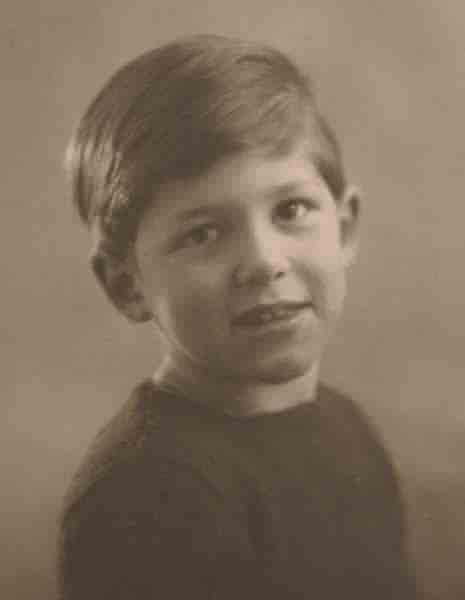
Courtesy of
Christopher &
Matt Edwards
Christopher Edwards, aged about 6, just before the war.
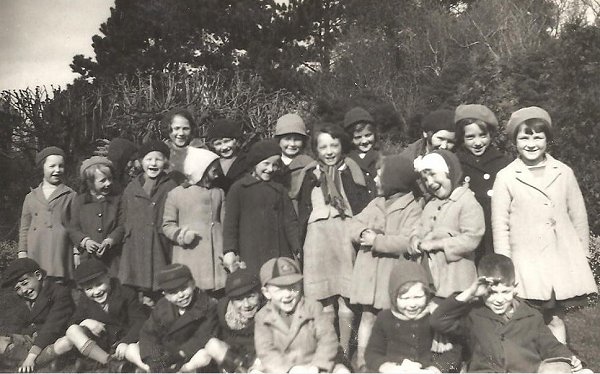
Courtesy of
Richard Venus.
This photograph
features in my
book "A-Z
of Yeovil"
Christopher Edwards (front row, extreme right) with Richard Venus (front row, third from left) and his classmates. Photographed in 1940.
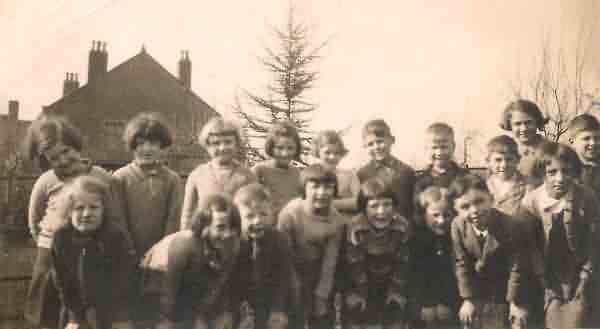
Courtesy of
Christopher &
Matt Edwards
Evacuees in Yeovil. Christopher 'Robin' Edwards (back row, far right) and Richard Venus (front row, second from right).
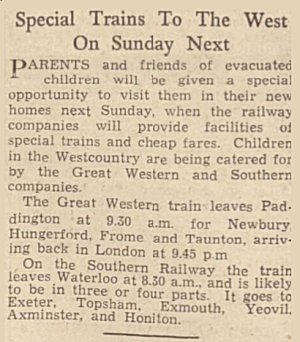
Notice of special cheap return fares for parents to visit their evacuee children in the Western Morning News of 30 November 1940.
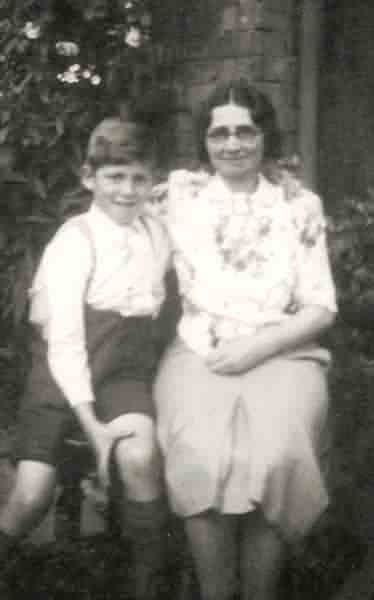
Courtesy of
Christopher &
Matt Edwards
Christopher with his mother Ida on her visit to Somerset, July 1941.
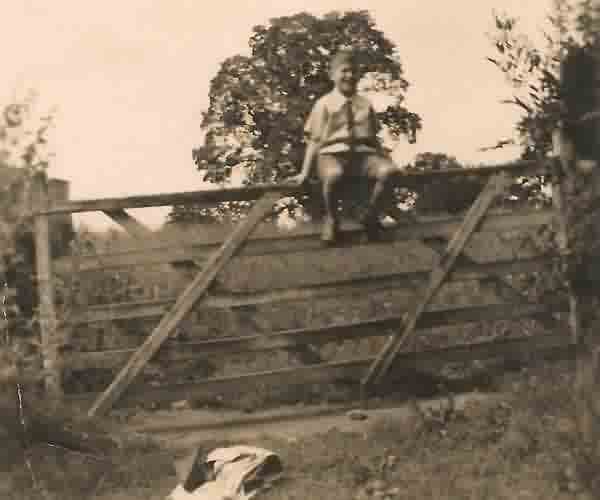
Courtesy of
Christopher &
Matt Edwards
Photograph of Chris Edwards, age 9, taken by his mother Ida while she visited during July 1941.
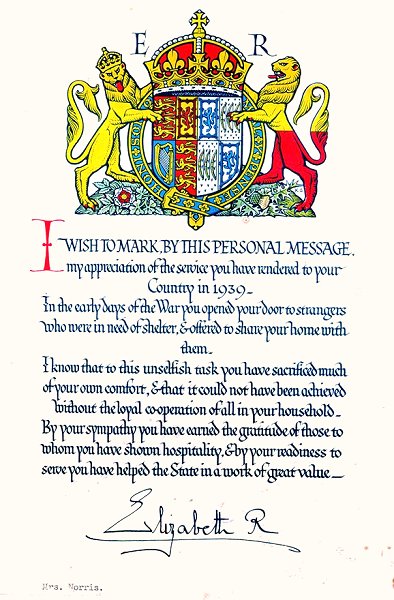
Courtesy of
Roger McElliott
This is the letter of thanks sent by HM the Queen to all those who took in evacuees. This particular letter was sent to Mrs Norris of Westland Road (Roger's grandmother).